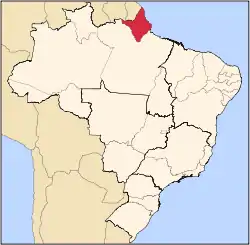Santana, Amapá
Santana (Portuguese pronunciation: [sɐ̃'tɐ̃nɐ]) is a municipality located in the southeast of the state of Amapá in Brazil. Its population is 123,096 and its area is 1,541 square kilometres (595 square miles), which makes it the smallest municipality of Amapá. Santana is a suburb of Macapá, the state capital, and the two cities make up the Metropolitan Area of Macapá. Its location is nearly on the equator. The planet's second longest river, the Amazon is to the south.[3][4]
Santana | |
|---|---|
Municipality | |
| The Municipality of Santana | |
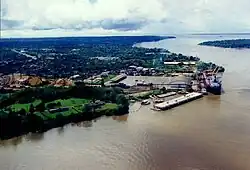 Port of Santana | |
 Flag  Seal | |
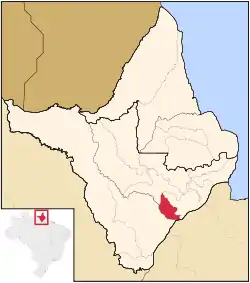 Location of Santana in the State of Amapá | |
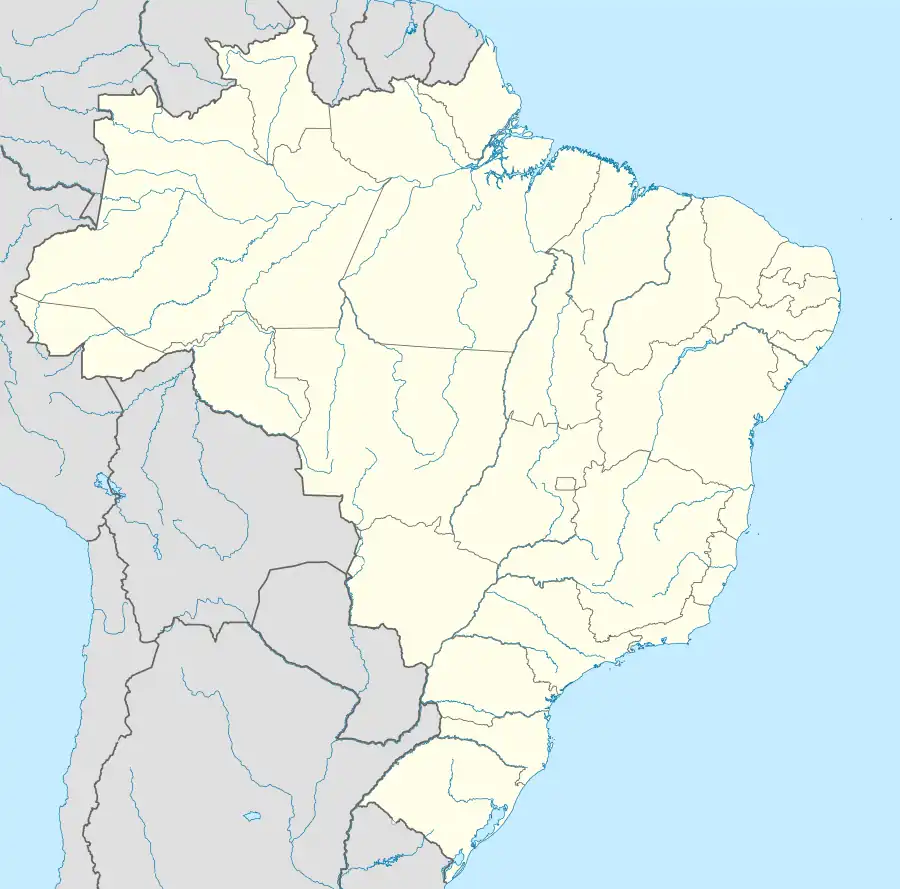 Santana | |
| Coordinates: 00°02′06″S 51°51′10″W | |
| Country | |
| Region | North |
| State | |
| Founded | 1 January 1982 |
| Government | |
| • Mayor | Ofirney Sadala (PSDC) |
| Area | |
| • Total | 1,541 km2 (595 sq mi) |
| Elevation | 5 m (15 ft) |
| Population (2020 est.[1]) | |
| • Total | 123,096 |
| • Density | 80/km2 (210/sq mi) |
| Time zone | UTC−3 (BRT) |
| HDI (2000) | 0.742 – medium[2] |
| Website | santana.ap.gov.br |
Santana was historically a part of Macapá. In 1981 it was elevated to the category of a District of Macapá. It became a separate municipality in the state of Amapá on 1 January 1982.[4]
History
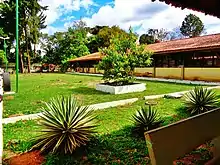
The history of Santana began in 1753 when Ilha de Santana, an island in the Amazon River in front of the city of Santana, became an official settlement.[5] The settlement on the coast started to develop in the 1950s when manganese was discovered in Serra do Navio. Santana has developed into the main harbour and industrial centre for the state, and has become the second most populous city.[6] In 1990, a campus of the Federal University of Amapá was opened in Santana.[7]
Geography
Neighbouring municipalities
- Macapá, north and east
- Mazagão, southwest
- Porto Grande, northwest
Port of Santana
The Port of Santana was built in 1980. It was originally intended for river transport, but due to its favourable position, it quickly developed into a main harbour for international transport to and from the Caribbean, United States and European Union. The harbour was inaugurated on 6 May 1982, and became a public company in 2002.[8]
The Port of Santana also provides ferry services. In 2020, the ferry between Santana and Belém was the largest ferry of Brazil measuring 115 metres (377 ft).[9]
Districts
In 2001 Santana was officially divided into six districts:[4]
- The city of Santana
- Anauerapucu
- Igarapé do Lago
- Ilha de Santana
- Piaçacá
- Pirativa
Sports
Independente Esporte Clube and Santana Esporte Clube are the football clubs based in the city of Santana.
Notable people
- Fabrício Guerreiro (1990), mixed martial artist[10]
- Raulian Paiva (1995), mixed martial artist[11]
References
- IBGE 2020
- UNDP
- "2012 Populational Estimate" (PDF). Censo Populacional 2012. Instituto Brasileiro de Geografia e Estatística (IBGE). July 2012. Retrieved 31 August 2012.
- "Amapá, Santana, infográficos: histórico" (in Portuguese). IBGE – Instituto Brasileiro de Geografia e Estatística. 2014. Retrieved 12 June 2014.
- "Santana". IBGE (in Portuguese). Retrieved 2 April 2021.
- "Santana". Government of Amapá (in Portuguese). Retrieved 6 April 2021.
- "Apresentação e Infraestrutura do Campus Universitário de Santana -CSTN". Unifap (in Portuguese). Retrieved 6 April 2021.
- "O Porto". Docas De Santana (in Portuguese). Retrieved 1 April 2021.
- "Maior balsa do Brasil começa a operar no Amapá". Seles Nafes (in Portuguese). Retrieved 5 April 2020.
- "Fabrício Guerreiro". Tapology. Retrieved 2 April 2021.
- "Raulian Paiva". Tapology. Retrieved 2 April 2021.
External links
- Official website (in Portuguese)
 Media related to Santana (Amapá) at Wikimedia Commons
Media related to Santana (Amapá) at Wikimedia Commons
